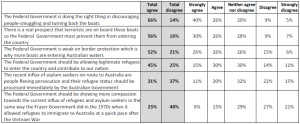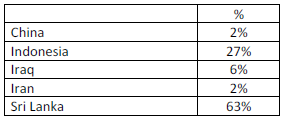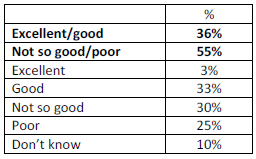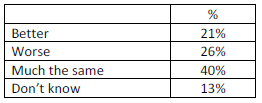This weeks Essential Report has the primaries running 49 (down 1) / 35 (down 1) to Labor, washing out into a two party preferred of 59/41 the same way – steady since last week. The Greens are on 8 (steady), while the broad “Others” are up 1 to 8. The missing point is due to rounding. This comes from a two week rolling sample of 2007, giving us an MoE that maxes out around the 2.2% mark.
Additional questions this week are on the asylum seeker issue and one on climate change. These come from a sample of 1122 for an MoE that maxes out around the 2.9% mark.
This is the long awaited polling on public perceptions of the asylum seeker issue and it’s politics – what is really worth noting is how the set of responses collectively paint a far more sophisticated picture of the country than a simple pro/anti asylum seeker stance leading into a pro/anti government policy stance and any consequent pro/anti Labor/Coalition position. Yet again, the public shows itself to be a little more complicated than some of our punditry muppets would have us believe. I’ve reordered the questions from as they appear in the actual report to start with the wider issues, before narrowing to the politics and finishing off with the ultimate political question on the issue.
The Federal Government is currently working with the Indonesian government to stop asylum seekers entering Australian waters. For each of the below statements that have been made about current incident of asylum seekers, please indicate your level of agreement.
The cross-tabs tell us:
Labor and Coalition voters were more likely than Green voters to think the Federal Government is doing the right thing in discouraging people smuggling and turning back the boats (72% Labor, 69% Liberal v 51% Green).
Coalition voters were more likely to agree with the statement that the Federal Government is weak on border protection which is why more boats are entering Australian waters (79%), while Labor voters were more likely to disagree (32%). However, 40% of Labor voters agree with this statement.
Green voters were more likely than Labor and Coalition voters to agree that the Federal Government should be allowing legitimate refugees to enter the country and contribute to the nation (62% Green v 47% Labor, 45% Liberal).
.
Which country do you think most of the asylum seekers who have been trying to get into Australia in recent weeks are from?
People aged 55 years and over were more likely than those in other age groups to think that most of the asylum seekers who have been trying to get into Australia in recent weeks are from Sri Lanka (79%), as were males (67%) and Coalition voters (70%).
Respondents who were aware that the current asylum seekers were from Sri Lanka were more likely to agree that the Federal Government should be allowing legitimate refugees to enter the country and contribute to our nation.
51% of people aware that the most recent asylum seekers are from Sri Lanka (compared to 35% of those not aware) agree that the Federal Government should be allowing legitimate refugees to enter the country and contribute to our nation.
.
Which of the following statements is closer to your view?
On the cross-tabs we have:
Males were more likely to agree with the view that suggests the reason for the recent influx of asylum seekers because of soft border protection approach of the Rudd Government (45%), while females were more likely to agree with the view that push factors such as violence and persecution result in refugees (63%).
Coalition voters were more likely to agree with the view that the Rudd Government has softened their border protection policies and this is the reason for the recent influx of asylum seekers (69%), while Labor (74%) and Green (83%) voters were more likely to be of the view that refugees are coming from places that have seen an escalation in violence and persecution that have pushed people to flee their homelands.
People aged 18 – 24 were more likely than those in other age groups to agree with the view that emphasizes push factors when it comes to explaining the issue of refugees (71%).
.
Overall, how would you rate the record of the Rudd Government when it comes to dealing with the issue of asylum seekers in Australia?
The cross-tabs tell us:
Results followed party lines – Labor voters were more likely to rate the Rudd Government’s handling as excellent/good (58%), while Coalition voters were more likely to rate it as not so good/poor (81%). 34% of Labor voters and 65% of Green voters rate the Government’s performance on this issue as not so good or poor.
.
Do you think a Liberal Government would do a better, worse or much the same job in dealing with the issue of asylum seekers and refugees in Australia?
On the cross-tabs we have:
Coalition voters were more likely to think a Liberal Government would do a better job (54%), while Labor (43%) and Green (41%) voters were more likely to think a Liberal Government would do a worse job.
35% of Liberal voters and 42% of Labor voters think a Liberal Government would do much the same job in dealing with the issue of asylum seekers and refugees in Australia.
People aged 55 years and over were more likely than those in other age groups to think that the Liberal Government would do a better job at dealing with the issue of asylum seekers (30%).
Do you agree that there is fairly conclusive evidence that climate change is happening and caused by human activity or do you believe that the evidence is still not in and we may just be witnessing a normal fluctuation in the earth’s climate which happens from time to time?
The cross-tabs have us:
People aged 25 – 34 were more likely to think climate change is caused by human activity (67%) while those aged 55 years and over were more likely to think what we are witnessing is a normal fluctuation in the earth’s climate (44%).
Labor (63%) and Green (85%) voters were more likely to think climate change is caused by human activity, while Coalition voters were more likely to think what we are witnessing is a normal fluctuation in the earth’s climate (54%).













Crikey is committed to hosting lively discussions. Help us keep the conversation useful, interesting and welcoming. We aim to publish comments quickly in the interest of promoting robust conversation, but we’re a small team and we deploy filters to protect against legal risk. Occasionally your comment may be held up while we review, but we’re working as fast as we can to keep the conversation rolling.
The Crikey comment section is members-only content. Please subscribe to leave a comment.
The Crikey comment section is members-only content. Please login to leave a comment.